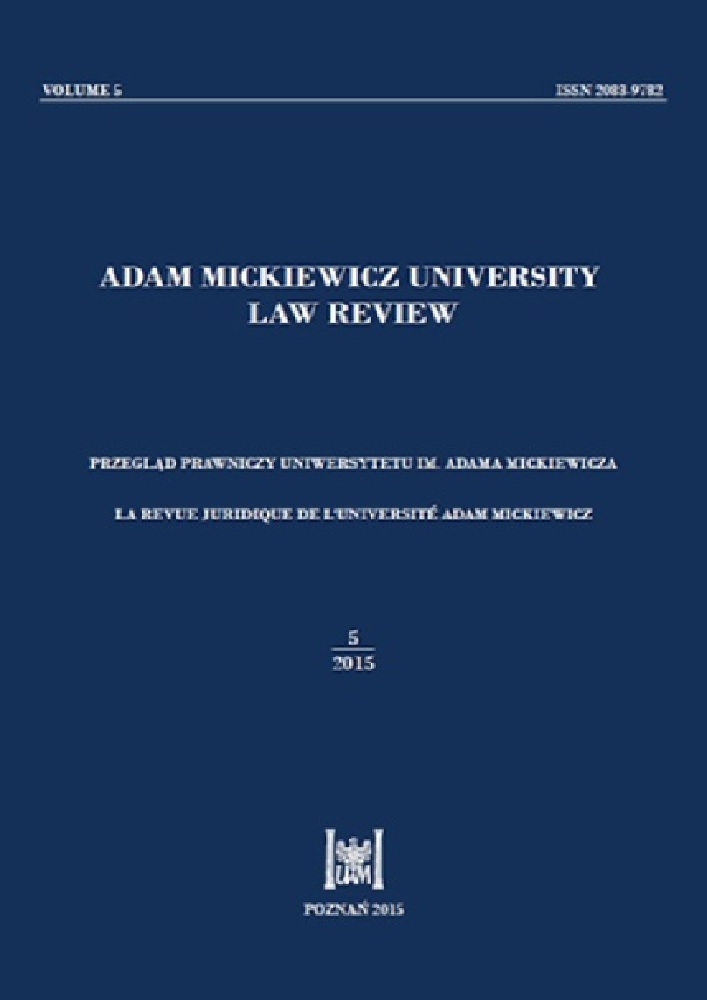Abstract
The aim of the considerations is to determine whether artificial intelligence units can take the place of humans in administrative proceedings ending with the issuance of discretionary decisions. The author starts from presenting the essence of discretionary decisions and guide the scope of judicial control over them. The presented considerations relate primarily to the potential placement of such devices in the “administrative justice system” that can be defined as artificial intelligence units in the strict sense. Therefore, this concerns devices for which human intervention is usually limited to switching on and technical supervision. However, the considerations can also be applied to such devices where human interference in their operation is slightly greater. It should be emphasized, however, that it this does not concern devices that are fully or almost fully controlled by humans.
References
Acemoglu D., Restrepo P., Robots and Jobs: Evidence from US Labor Markets, “Journal of Political Economy”, vol. 128, no. 6.
Bastiat F., Dzieła zebrane, 1, Warszawa 2009.
Biłasz J. M., Sądowa kontrola decyzji uznaniowych wydawanych przez organy administracji, “Rocznik Samorządowy” 2015, no. 4.
Błaś A., Prawne formy działania administracji publicznej, in Prawo administracyjne, ed. J. Boć, Wrocław 1997.
Carlson A. M., The Need for Transparency in the Age of Predictive Sentencing Algorithms, “Iowa Law Review” 103, p. 303–329.
Chui M., Manyika J., Miremadi M., Where machines could replace humans – and where they can’t (yet), „McKinsey Quarterly” 08.07.2016.
Decoste D., The Future of Chess – Playing Technologies and the Significance Kasparov Versus Deep Blue, „AAAI Technical Report” 04.1997.
Dixon Jr. H. B., Artificial Intelligence: Benefits and Unknown Risks, 15.01.2021.
Gębala K., Uznanie administracyjne w systemie prawa niemieckiego, „Państwo i Prawo” 2011, no. 1.
Hornyak T., Did a bug in Deep Blue lead to Kasparov’s defeat?, „C|NET”, 27.09.2012.
Janiszewski P., Aksjologiczne uwarunkowania uznania administracyjnego, „Folia Iuridica Universitatis Wratislaviensis” 2020, vol. 9, 1.
Jaśkowska M., Instytucje prawa administracyjnego. System Prawa Administracyjnego 1, in Uznanie administracyjne a inne formy władzy dyskrecjonalnej administracji publicznej, eds. R. Hauser, A. Wróbel, Z. Niewiadomski, Warszawa 2015.
Jaśkowska M., Uznanie administracyjne w orzecznictwie sądów administracyjnych, „Zeszyty Naukowe Sądownictwa Administracyjnego” 2010, no. 5–6.
Jędrzejczyk M., Koncepcje ograniczające swobodę organu w ramach uznania administracyjnego, „Przegląd Prawniczy, Ekonomiczny i Społeczny” 2012, no. 3.
Lem S., The Inquest, in Tales of Pirx the Pilot, S. Lem, Warsaw 1968.
Liu H., Lin Ch., Chen Y., Beyond State v. Loomis: Artificial Intelligence, Government Algorithmization, and Accountability, “International Journal of Law and Information Technology” 2019, vol. 27, p. 122–141.
Mariański A., Komentarz do art. 48, in Ordynacja podatkowa. Komentarz, eds. A. Mariański Warszawa 2021.
Ochendowski E., Prawo Administracyjne. Część ogólna, Toruń 1998.
Radzikowski K., Zasady podejmowania i kontroli sądowej decyzji w sprawie umorzenia zaległości podatkowych w świetle uznania administracyjnego, „Kwartalnik Prawa Publicznego” 2006, no. 6,4, p. 153–178.
Reardon S., Artificial neurons compute faster than the human brain, “Nature” 26.01.2018.
Semuels A., Millions of Americans Have Lost Jobs in the Pandemic – And Robots and AI Are Replacing Them Faster Than Ever, „Time” 06.08.2020.
Szot A., Słuszność a uznanie administracyjne, „Studia Iuridica Lublinensia” 2011, no. 15.
Judgment of the Voivodship Administrative Court in Opole of 19 March 2004, I SA/Wr 3478/01.
Judgment of the Voivodship Administrative Court in Wrocław of 17 October 2019, IV SA/Wr 296/19.
Judgment of the Voivodship Administrative Court in Białystok of 06 November 2019, I SA/Bk 305/19.
